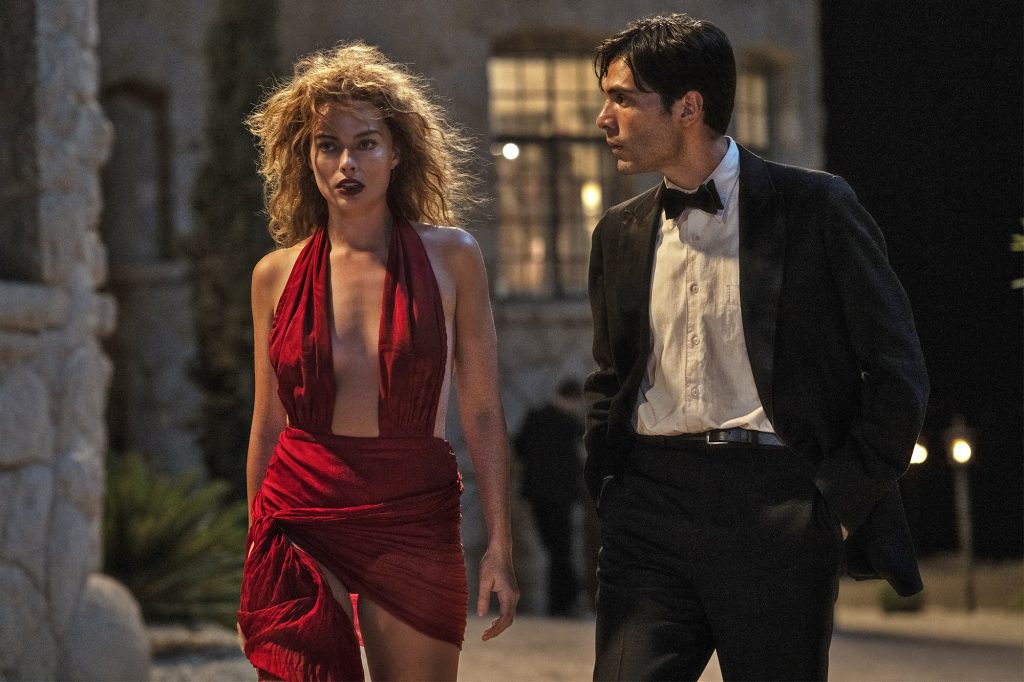Babylon (and on…and on…and ON…for THREE whole hours!), like the ungodly city after which it’s named, was a confused mess of biblical proportions. The plot was senseless, the filth gratuitous, the writing sloppy, the budget bloated, the talent wasted, and the running time unmercifully long.
***
There are certain sights, sounds, and substances to which we humans, regardless of the culture in which we were raised, have a naturally strong aversion.
You’ll forgive me, gentle friend and reader, but I’ll proceed to set before you an incomplete list of such things. I call to your attention, for instance, the excrementitious humors: feces, urine, vomit, and—yes—the seminal fluids. As everyone with young children, an incontinent elder, or a pet dog knows, these are the filthy, stinky, unspeakable things of which, not infrequently, and with utter disregard for where you are in the world, the body feels an acute and inexorable urge to relieve itself.
When it does, as so often it does, it paints a rather foul picture. An even worse motion picture, I should say, from which you hardly need me to tell you to avert your gaze. But, should you fail to look away, you’ll be met with a scene of icky fluids, nasty secretions, and gross bodily byproducts that excite our deepest sense of disgust. With the slightest whiff, glance, or—heaven forbid—touch of these ugly things, your revulsion will at once be aroused, your gag reflex tickled, and your frantic desire to get away, sparked.
Within the first twenty minutes of Damien Chazelle’s latest film, Babylon, I experienced all the foregoing reactions: disgust, revulsion, queasiness, and, above all, a very real and pressing desire to exit the theater into which I’d only just walked moments ago. Before reacquainting myself with the bone-chilling cold of the late December evening from which I was only too happy to find temporary refuge, I was tempted to request from the young man dutifully stationed at the box office a full refund for what might be, in the opinion of this humble, unknown reviewer, one of the worst films that I’ve ever had the misfortune to see.
Somehow, I was able to check my impulse to get up and, for the first time in my cinema-attending career, completely abandon a film within its first half hour. I decided, against my better judgment, to remain seated in that threadbare theater chair and endure, for three unmercifully long hours, the rest of this worst of all films, Babylon.
Set in the debauched decade of the 1920s, the film begins by drawing our attention to a character named Manny (played by the talented Diego Calva). Manny is a lowly doer of domestic odds and ends employed by a big-time Hollywood studio executive. The executive, upon whom Manny is quietly dependent for the advancement of his career, is hosting a party in his palatial hilltop estate. Like all the best parties in Prohibition-era Tinseltown, this is one to which everyone is desperately seeking an invitation—from the local crooked cop, to the dolled-up no-name hussy (a character, we soon learn, called Nellie LaRoy, played by Margot Robbie) who hails from far-off New Jersey.
Manny, a swarthy, handsome portrait of an industrious young man whose parents immigrated to this country when he was a boy, is tasked with the risible, seemingly impossible job of transporting a giant CGI elephant up a large hill. The truck used for the elephant’s hauling proves unequal to the demands of the load put upon it and, worse, to the treacherous incline it’s supposed to climb. As the truck slows and begins to roll backward, Manny and his pal jump out of their own truck and rush to the elephant’s massive rump from which–you guessed it–a copious stream of excrement pours out.
The depiction of the elephant’s bowel discharge is, to put it mildly, obscenely graphic and unnecessarily long. It’s also, how shall I say, very much in your face. In response to it, a collective cringe could be felt passing through my fellow theatergoers who were, no doubt because of their high regard for Chazelle’s previous works (and the glittering accolades with which they were so bounteously showered), prepared to pardon this opening scatological scene. Surely, we thought, this was but a transient lapse into his world of childish indecency and boyish misbehavior. It must be Chazelle’s intention to shock us with some bathroom humor before moving on to higher and nobler things.
But higher and nobler things never came, and I can assure you that I waited very patiently for their arrival.
Almost immediately after the conclusion of the elephant s**t scene, the camera cuts to a bedroom in the mansion in which the party—one of the wildest you’ve ever seen—is underway. On the floor, supine, an extremely fat, unclothed man chuckles as a slender vixen approaches him from above. She proceeds to gratify his aberrant sexual desire by (I hesitate to say) urinating all over his chest and face. This is an act known by those better acquainted with such things as a “golden shower” (on which that vast repository of seedy words, “Urban Dictionary”, has just now educated me). The fat man, whose soaked abdomen begins to quiver and shake with delight, appears to enjoy the unholy dousing. He quite likes this dirty baptism by pee.
It could be that I’m just a bit prudish. Perhaps I’m somewhat odd in being, well, unaroused by the weird sexual perversions from which others seem to derive no small pleasure, but this scene was not only unnecessary for the plot’s development, but absolutely revolting to the sensibilities of a common man. I don’t think I’m alone in declaring it as such. The collective cringe circulating through the theater (of which, you’ll recall, the explosion of elephant dung was, just minutes ago, the stimulant) doubled at the sight of this next awful act. The discomfort in the cinema was palpable. I glanced to my left and then to my right and saw impatient, unsettled looks begin to overtake people’s faces.
The nameless, amorous young lady proceeds to collapse and foam at the mouth–a result, we’re later told, of the illicit drugs she’d taken. The camera then removes us from the sordid bedroom in which she’s slowly dying to the orgiastic party downstairs. There, from wall-to-wall, ceiling-to-floor in this opulent mansion, naked people are having anal, vaginal, everything but oral sex (so far as I could tell, though I can’t say positively there wasn’t a mouth somewhere occupied by the genitals of another). Nothing is shielded from the viewer’s eyes: every inch of the flesh, every thrust of the hips; every facial contortion and pelvic gyration is exposed to his wincing gaze.
I’m told Babylon is supposed to be a period piece—an accurate depiction of the looseness and promiscuity with which the roaring twenties have become synonymous. It looks, instead, like the Dionysian fever dream of a sex-crazed Millennial. It looks like the dark vision of some man-child trapped in the bottomless pit of pornographic smut. Of the 1920s, I’ve read many vivid and reliable accounts, in which things may have been colored in a slightly more lavish and dissolute hue, but Chazelle, in an attempt to shock his audience and obscure the gaping holes in his feeble plot line, really overdoes it.
Okay, to review:
I’ve covered the feces, the urine, and the seminal fluids with which Chazelle, in a display of complete directorial ineptitude (or Freudian psychopathology, or bathroom boyishness), showers us in the film’s first twenty minutes. For the vomit, one has to wait till the film’s midway point (about one hour and a half in. Don’t forget—this film is three hours long!), when Margot Robbie’s character throws up, in projectile fashion, all over a man’s face and tuxedo. After recovering for a moment, she proceeds to throw up again, this time on his elegant carpet. Again, as with the elephant dung, it’s a scene of unnecessary vividness and length. And she vomits not once, but twice, doubling the viewer’s discomfort.
In this admittedly unprofessional review (out of which, I warn you, you may not get very much), I focused only on what I call the excrementitious humors. It is, after all, with them that I’ll forever associate this horrible film. That said, I’ll comment briefly on some of its other notable failures: the plot was a directionless mess; the story was sloppily written; the pacing was nonexistent; the digressions (including a snake bite and an infernal voyage with Toby Maguire) were disturbing; the budget was over-bloated; the talented actors, for whose compensation that budget was needed, were criminally misused; the filth was gratuitous; the “wokeness”, unsubtle; and the running time, unmercifully long.
If you want to see a film—a great and immortal film—about Hollywood’s dramatic transition from silent to spoken pictures, go watch Gene Kelly’s timeless masterpiece, Singin’ In The Rain. Released in 1952, it’s one of the best movies in the history of cinema–an assertion with which no objective critic would disagree. On account of its greatness, because of its immortality, it’s a film to which I return again and again with undiminished delight. As for you…it’s a film you shouldn’t go another day without seeing, if, in fact, you’ve not seen it yet.
Chazelle, not only an occasional practitioner, but an alleged student of cinematography, openly acknowledges the greatness of Singin’ In The Rain. He clearly acknowledges the debt that he and every other artist owe to it. This is evident by his inclusion of some of its most iconic scenes toward the end of his own work. By including them, he succeeds at temporarily moving his audience from the profane (his work) to the sacred (that of Gene Kelly) and allowing us to feel a fleeting rush of joy. But, alas, we’re no sooner singin’ in the rain than we’re brought right back to Babylon.
The truth is, the inclusion of another film is the best part of his.
I implore you: the next time that you’re out on the town and in search of entertainment, forego the theater, stop by your local library, rent Singin’ in the Rain for free, watch it, enjoy it, watch it again, sing along to its wonderful soundtrack, relish in its directorial brilliance, appreciate its novelty of conception, shake your hips to its masterful choreography, and forget all about Chazelle and his meaningless golden showers.
I urge you–go singin’ in the rain instead.

